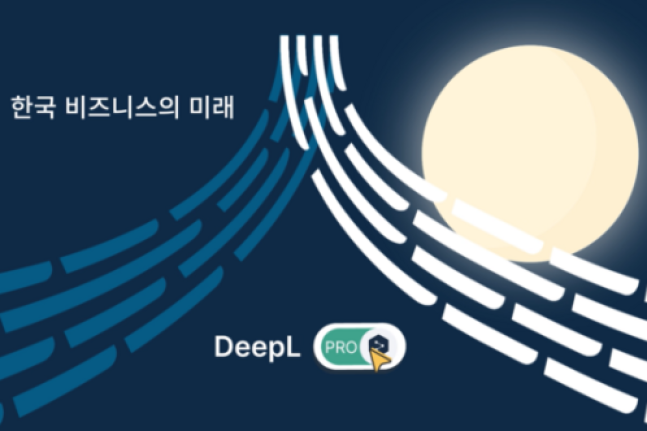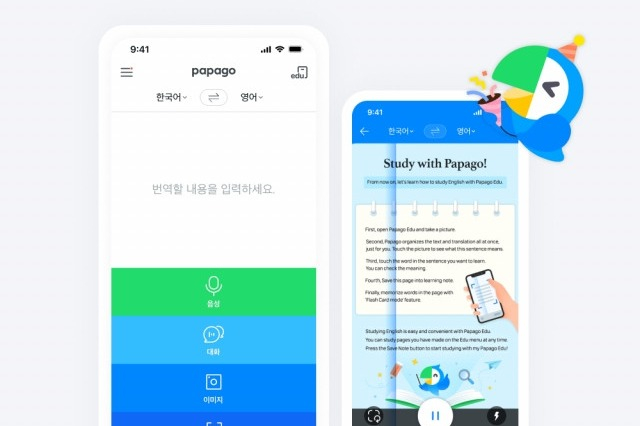Naver's translation app Papago faces challenge from German competitor
DeepL releases a paid version in S.Korea amid fierce competition on the latter's translation tool market
By Aug 18, 2023 (Gmt+09:00)
When in S. Korea, it’s a ritual: Foreigners make stops at CU, GS25, 7-Eleven


Maybe Happy Ending: A robot love story that rewrote Broadway playbook


NPS yet to schedule external manager selection; PE firms’ fundraising woes deepen


Samsung steps up AR race with advanced microdisplay for smart glasses


Seoul appeal: Korean art captivates Indonesia’s affluent connoisseurs



A German competitor has entered South Korea's translation tool market to challenge No. 1 Naver Corp. and No. 2 Google.
The Cologne, Germany-based artificial intelligence company DeepL has launched in the country a paid version of its translation service that supports 31 languages.
DeepL on Thursday announced the launch of DeepL Pro, a paid service available in 31 languages that translates while maintaining the text's original document format such as PDF and Microsoft Word and PowerPoint. Available to both businesses and individuals, the tool also has a function to automatically delete the original text after its translation.
Since its release in January of a Korean-language translation service that is free but with restricted use, DeepL has grown in popularity through word of mouth for its high accuracy. Unlike Google Translate or Naver’s Papago, both of which interpret the words in a sentence sequentially, DeepL identifies the meaning of each word and combines them to produce the correct translation.
For example, DeepL understands metaphors as it translates the word “Washington” in foreign media as “the US government” depending on context. Its Korean-to-English translation is also smooth, with a search for "galbijjim" resulting in "braised short ribs" rather than the Korean word written in English.
DeepL has 500,000 paying customers, 20,000 of whom are corporate. Its management says DeepL Pro's accuracy is three times better than Google Translate's.

The unquestioned leader of the domestic translation tool market is Papago, which remained No. 1 in the number of users for six consecutive years. Last month, 61% of the nation's translation app users chose Papago, and the app's number of monthly active users exceeded 10 million in June.
In 2021, Naver launched the language learning service Papago Edu.
Google Translate, No. 2 on the domestic market, is strong in user accessibility and diversity of languages offered. Earlier this month, the Mountain View, California-based corporation unveiled a function that automatically translates around 100 languages in Gmail.
Write to Ju-Hyun Lee at deep@hankyung.com
-
 Artificial intelligenceNaver’s AI translation app Papago surpasses 10 mn MAU
Artificial intelligenceNaver’s AI translation app Papago surpasses 10 mn MAUJun 21, 2023 (Gmt+09:00)
1 Min read -
 Artificial intelligenceKorea’s first ChatGPT-authored, AI-proofread book due this week
Artificial intelligenceKorea’s first ChatGPT-authored, AI-proofread book due this weekFeb 19, 2023 (Gmt+09:00)
3 Min read -
 Tech, Media & TelecomNaver’s Japan-focused B2B unit swings to profit
Tech, Media & TelecomNaver’s Japan-focused B2B unit swings to profitJan 05, 2023 (Gmt+09:00)
1 Min read -
 Artificial intelligenceAI-powered translation startups tackle niche marketplaces
Artificial intelligenceAI-powered translation startups tackle niche marketplacesOct 11, 2022 (Gmt+09:00)
3 Min read


